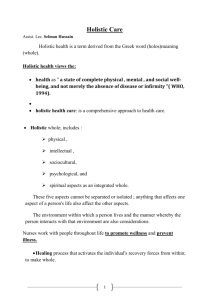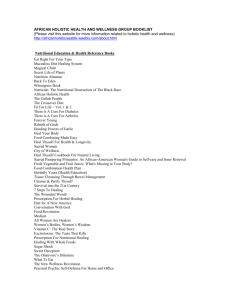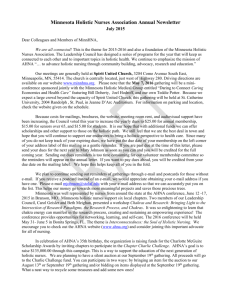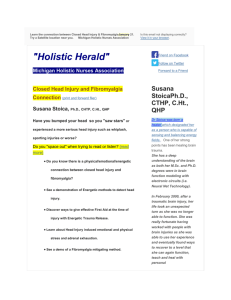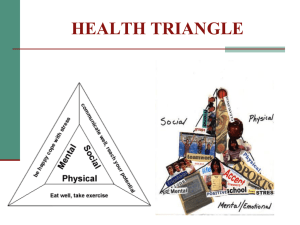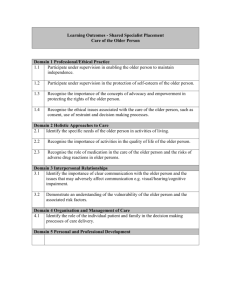Holistic Care
advertisement
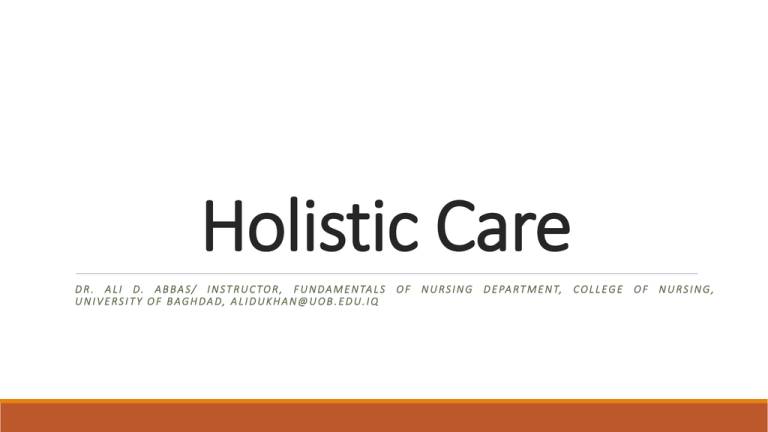
Holistic Care D R . A L I D . A B B A S / I N S T R U C TO R , F U N D A M E N TA L S U N I V E R S I T Y O F B A G H D A D, A L I D U K H A N @ U O B . E D U . I Q OF NURSING D E PA RT M E N T, COLLEGE OF NURSING, As a nurse, you will be a professional caregiver. Your intimate contact with clients allows you the opportunity not only to provide physical and emotional support but also to teach ways to take an active role in maintaining health. 1. Interrelated Concepts of Health Health is "the condition of being sound in body, mind, or spirit" (Merriam-Webster Online Dictionary, 2008). The WHO defines health as follows: "Health is a state of complete physical, mental, and social well-being and not merely the absence of disease or infirmity" (WHO, 1974). Health refers to the total well-being of the whole person. (Telstar Innovations, Inc., 2000). Holistic is a term derived from the Greek word holes, meaning "whole." Holistic health views the physical, intellectual, sociocultural, psychological, and spiritual aspects of a person's life as an integrated whole. These five aspects cannot be separated or isolated; anything that affects one aspect of a person's life also affects the other aspects. Healing means to be or become whole. It is a state of harmony or balance in the body, mind, and spirit connection. (Quinn, 2005) Homeostasis is the balance or stability that the body strives to achieve among these aspects of a person's life by continuous adaptation. The goal of holistic nursing is the "enhancement of healing the whole person from birth to death" (American Holistic Nurses Association [AHNA], 2004). The AHNA supports the belief that health involves the harmonious balance of body, mind, emotions, and spirit within an ever-changing environment. The NIH defines holistic care as care that "considers the whole person, including physical, mental, emotional, and spiritual aspects. Among the holistic modalities most frequently used in nursing are the following: Biofeedback Exercise and movement Goal setting Humor and laughter Imagery Journaling Massage Play therapy Prayer Therapeutic touch The holistic nurse is "an instrument of healing and a facilitator in the healing process (AHNA, 2004). By does the following: Demonstrates awareness that self-healing is a continual process Is familiar with self-development Recognizes personal strengths and weaknesses Models self-care Demonstrates awareness that personal presence is as important as technical skills Respects and loves clients Presumes that clients know the best life choices Guides clients in discovering creative options Listens actively Shares insights without imposing personal values and beliefs Accepts client input without judgment Views time spent with clients as an opportunity to serve and share (adapted from Dossey, 1998) Wellness is a responsibility, a choice, a lifestyle design that helps maintain the highest potential for personal health (Hill & Howlett, 2005). The health continuum is a way to visualize the range of an individual's health, from highest health potential to death. Abraham Maslow developed a theory of behavioral motivation based on needs. This theory is often referred to as Mallow's Hierarchy of Needs. 2. Providing Quality Care ►The first step in providing quality client care is to be aware of yourself. What kind of personality do you have? Is your self-concept positive, or do you have self-doubts and lack selfconfidence? What are your beliefs and attitudes? Knowing the answers to such questions will help you in your role as caregiver. ►The next step is taking care of your own needs. When you attend to the needs in your own life, you are then free to concentrate on caring for others. Your example of self-care inspires clients to have confidence that you will provide quality care. Thus, self-care is a factor in your effectiveness as a caregiver. Self-awareness is consciously knowing how the self thinks, feels, believes, and behaves at any specific time. Being self-aware is a constant process that is focused on the present. A person's thoughts, feelings, and beliefs are interrelated and greatly influence behavior. Being self-aware influences a person in several ways. For example, experienced nurses—are often anxious about caring for a specific client. By taking some time to practice selfawareness, the nurse might discover that the anxiety stems from never having performed the procedure in question. The nurse can then deal directly with the situation by reviewing the procedure and requesting assistance from an instructor or supervisor. All decisions about client care must be made in response to the client's needs, not the nurse's needs. Self-concept is how a person thinks or feels about himself. These thoughts and feelings come from the experiences the person has with others and reflect how the person thinks others view him. For example, an individual who is constantly ignored or who receives messages such as "Don't bother me," "Can't you do anything right?" or "You don't have any sense" may very well begin to view himself in these terms, with the likely result being a negative self-concept. On the other hand, a person who is shown caring and who hears messages such as "Let me help you in a minute," "Let's try it this way," or "Have you thought about ... ?" will move toward a positive self-concept. 3. Self-Care as a Prerequisite to client care Physical wellness refers to a healthy body that functions at an optimal level. To achieve physical wellness, a person must practice: ►Grooming ►Body Mechanics ►Posture ►Smoking ►Drugs and Alcohol ►Nutrition ►Sleep, Rest, Relaxation, and Exercise Intellectual wellness is the ability to function as an inde- pendent person capable of making sound decisions. Such decisions are based on the individual's needs but at the same time take into account the needs of others. Clear thinking, problem-solving skills, good judgment, and the desire to continually learn are all qualities found in the person who is intellectually well. Sociocultural wellness is the ability to appreciate the needs of others and to care about one's environment and the inhabitants of it. As a nurse, you will care for clients of all ages and races who speak different languages and come from various cultural groups. Psychological wellness encompasses the enjoyment of creativity, the satisfaction of the basic need to love and be loved, the understanding of emotions, and the ability to maintain control over emotions. Spiritual wellness manifests as inner strength and peace. Spirituality is a broad concept incorporating more than a client's religious affiliation. It encompasses the beliefs that a person has that give meaning and purpose to their existence (Fitchett, 2002).
